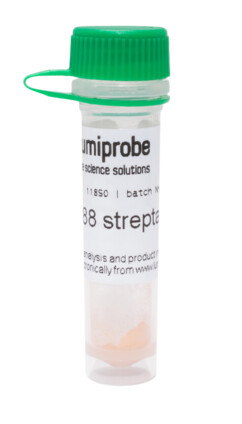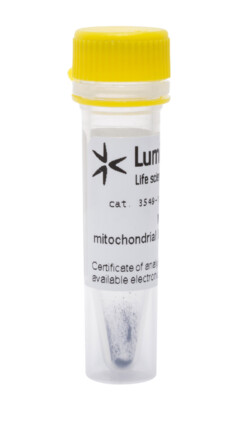AF 488 streptavidin
| Cat. # | Quantity | Price | Lead time | Buy this product |
|---|---|---|---|---|
| A18S0 | 100 ug |
–
|
in stock | |
| 118S0 | 1 mg |
$185
|
in stock |

Streptavidin is a tetrameric biotin-binding protein derived from the bacterium Streptomyces avidinii. Streptavidin binds up to four biotin molecules with high affinity and selectivity via multiple hydrogen bonds and van der Waals interactions. Due to the lack of carbohydrate modifications and a near-neutral pI, streptavidin exhibits less nonspecific binding than another biotin-binding protein — avidin. Streptavidin also has high thermostability and resistance against extreme pH, denaturing agents, and enzymatic degradation, allowing using this protein under various experimental conditions.
Fluorescent conjugates of streptavidin are commonly used as a second-step reagent for specific detection of a variety of biotin-labeled biomolecules, such as proteins (antibodies, etc.), nucleic acids, lipids, and other molecules in indirect immunofluorescent staining, western blots, flow cytometry, microplate assays, and other detection techniques.
This streptavidin is a lyophilized conjugate with AF 488, a bright, photostable green fluorophore with spectral characteristics similar to FITC (absorption max. at 495 nm, emission max. at 519 nm).
The recommended concentration range for use is 0.5-10 µg/mL. Avoid using biotin-containing solutions (some serums, RPMI 1640, etc.) as diluents.
Absorption and emission spectra of AF 488

Recommended protocol
Calculator
Customers also purchased with this product
General properties
| Appearance: | orange solid |
| Solubility: | good in water |
| Storage conditions: | Store at -20°С 9 months from date of receipt. Transportation: at room temperature for 1 week. |
| MSDS: | Download |
| Product specifications |
Spectral properties
| Excitation/absorption maximum, nm: | 495 |
| ε, L⋅mol−1⋅cm−1: | 71800 |
| Emission maximum, nm: | 519 |
| Fluorescence quantum yield: | 0.91 |
| CF260: | 0.16 |
| CF280: | 0.10 |























 $
$ 
